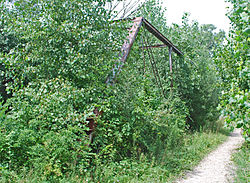History
The bridge was built by the Wrought Iron Bridge Company of Canton, Ohio, in 1891. A local crew assembled it with iron connecting pins, a method unique to the nineteenth century. The bridge was at the site of the town of Dover, a mill town of which little currently remains. [2]
In late 1992, a drunk driver crashed into an end post on the bridge, resulting in its closure for part of 1993. [3] [4] Residents complained about having to detour a significant distance, so the bridge was reopened by the county road commission with a 4-short-ton (3.6 t) weight limit, preventing its use by heavy vehicles. [3] [4] However, abutment stones continued to dislodge themselves, and the bridge was again closed to traffic. [4] In 1995, the road commission requested funds from the state's Critical Bridge Fund for the replacement of the bridge with a two-lane concrete structure. However, residents wished to see the bridge repaired, and they successfully convinced the road commission to not seek a replacement. [3] They also pushed for listing the bridge on the National Register of Historic Places; [3] the bridge was listed on November 29, 1996. [5] It is the third oldest known bridge built by the Wrought Iron Bridge Company still in existence. [6] It is also one of about ten metal through truss bridges in Michigan that date from the nineteenth century. [2]
By 1997, the abutments were in such poor condition that it was feared that the bridge would be washed away in a spring flood, so it was removed from its abutments and placed on the southeastern riverbank. [3] [7] Since it was moved to the riverbank, the bridge has become overgrown with brush. [3] On June 17, 1997, it was designated a Michigan State Historic Site and an informational marker was erected on February 2, 1999. [2] Because of the bridge's deteriorated state, its National Register of Historic Places plaque is located not on the bridge, but in the garage of resident Bill Klinke. [3]
On February 17, 2015, Dexter Township relinquished its right of first refusal to keep ownership of the bridge, allowing another municipality interested in relocating and rehabbing it for pedestrian use along the Border to Border trail to claim it. [8]
In 2018, the bridge was relocated to a storage facility in Holt, Michigan to await repair and potential reuse as part of the Border-to-Border Trail. [9]
This page is based on this
Wikipedia article Text is available under the
CC BY-SA 4.0 license; additional terms may apply.
Images, videos and audio are available under their respective licenses.






